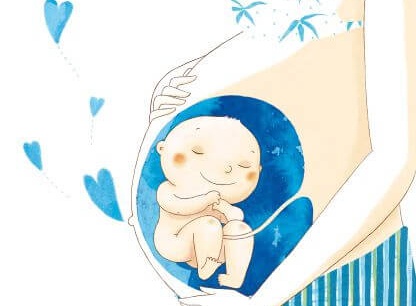Pregnancy: Loving Someone You Don't Know Yet

Pregnancy lasts nine months. Where an umbilical cord connects two hearts, two worlds in one where something wonderful happens yet unknown at the same time. Believe it or not, our emotions can cross the placental barrier to also caress our child.
It is interesting how during pregnancy families worry about buying a crib, clothes, being careful that the mother to maintains a good diet, but what about if you experience stress? … According to many scientists, we tend to neglect the emotional world of the mother which affects the developing fetus.
Pregnancy is a mystery and is hope: it is about loving someone whose face we do not yet know. It is imagining their laughter and the color of their hair as we caress their shape through the mother’s skin and transmit our sincere affection.
Vivette Glover, a specialist in perinatal psychobiology at Imperial College London, pioneered what is known as “emotional education from the womb,” a theory of great interest and importance that we wish to share with you.

The importance of our emotions during pregnancy
Until recently it was thought that the emotional world of the mother did not affect fetal development. That is a mistake. Works such as those published in the journal “New Parents Support” explain that the “magic intrauterine package” is very receptive to emotions, especially during the fourth month.
The media, society and the family itself often extol the beauty of pregnancy. But the importance of being able to connect the body and emotions with the baby it is actually rarely taught, as emotions will influence their development.
When emotions go beyond the placenta
Vivette Glover herself, as well as specialists in Gestalt therapy, stress the importance of caring for the mother in a more comprehensive way. Ultrasounds and blood tests are not enough. It is necessary to take care of their emotional state.
Dr. Glover conducted a study of 14,000 pregnant women where their level of anxiety and stress was measured. The follow-up lasted for 5 years to see how well children grew and matured.
It was found that mothers suffering from high stress levels had twice the risk that their children were diagnosed with hyperactivity. When the mother is in a stressful situation, the hypothalamus releases a hormone called CRH which causes the adrenal glands to secrete cortisol.
The placenta acts as a filter and the cortisol, which is detected as a “toxin”, does not usually go beyond that barrier. If CRH levels are very high, they end up crossing the placenta to directly affect the fetus and put it “on alert.”
Emotional education of children does not start when they come into the world, but in the womb.
What I Would Like People To Understand About Losing A Child
Losing a child is something that nature should not allow, but the world, life, does not know justice. And no mourning … More »

Emotional education from the womb
You do not even know your child and yet you see the world differently and have made your weaknesses your strengths. We should note that their education starts from the times they are in the womb — the place where they are comfortable but are not isolated. In which they are very responsive not only to what is outside, but also what happens inside.
Therefore, it is important that every mother and every parent take into account these important aspects:
- Reformulation of some concepts: surely you’ve heard more than once “the important thing is the child, all the sacrifice is worth it.” The baby is important, but we must also take care of the body and heart that gives life: the mother.
- Every pregnant mother lives in a certain way: there are women who did not expect to become pregnant, others facing pregnancy after suffering an abortion in the past. It is necessary to pay attention to each case, be aware of our particular reality and face it with integrity and great support.
- Slow down, prioritize yourself, surround yourself with positive stimuli: change the pace of your days and focus on the present, to enhance bonding with your partner to give you pleasant moments, fill you with excitement and face the changes of your body normally.
- Test new therapies: today many emotional education workshops are offered during pregnancy. Also, applying mindfulness, yoga, or massaging the belly while we are calm and listening to music can offer benefits to both mothers and fetuses.

If We Feed Children Love, Their Fears Will Starve
The emotional education of children is fundamental. This will be achieved by fertilizing their growth with the warmth of love and unconditional support. See more
Pregnancy lasts nine months. Where an umbilical cord connects two hearts, two worlds in one where something wonderful happens yet unknown at the same time. Believe it or not, our emotions can cross the placental barrier to also caress our child.
It is interesting how during pregnancy families worry about buying a crib, clothes, being careful that the mother to maintains a good diet, but what about if you experience stress? … According to many scientists, we tend to neglect the emotional world of the mother which affects the developing fetus.
Pregnancy is a mystery and is hope: it is about loving someone whose face we do not yet know. It is imagining their laughter and the color of their hair as we caress their shape through the mother’s skin and transmit our sincere affection.
Vivette Glover, a specialist in perinatal psychobiology at Imperial College London, pioneered what is known as “emotional education from the womb,” a theory of great interest and importance that we wish to share with you.

The importance of our emotions during pregnancy
Until recently it was thought that the emotional world of the mother did not affect fetal development. That is a mistake. Works such as those published in the journal “New Parents Support” explain that the “magic intrauterine package” is very receptive to emotions, especially during the fourth month.
The media, society and the family itself often extol the beauty of pregnancy. But the importance of being able to connect the body and emotions with the baby it is actually rarely taught, as emotions will influence their development.
When emotions go beyond the placenta
Vivette Glover herself, as well as specialists in Gestalt therapy, stress the importance of caring for the mother in a more comprehensive way. Ultrasounds and blood tests are not enough. It is necessary to take care of their emotional state.
Dr. Glover conducted a study of 14,000 pregnant women where their level of anxiety and stress was measured. The follow-up lasted for 5 years to see how well children grew and matured.
It was found that mothers suffering from high stress levels had twice the risk that their children were diagnosed with hyperactivity. When the mother is in a stressful situation, the hypothalamus releases a hormone called CRH which causes the adrenal glands to secrete cortisol.
The placenta acts as a filter and the cortisol, which is detected as a “toxin”, does not usually go beyond that barrier. If CRH levels are very high, they end up crossing the placenta to directly affect the fetus and put it “on alert.”
Emotional education of children does not start when they come into the world, but in the womb.
What I Would Like People To Understand About Losing A Child
Losing a child is something that nature should not allow, but the world, life, does not know justice. And no mourning … More »

Emotional education from the womb
You do not even know your child and yet you see the world differently and have made your weaknesses your strengths. We should note that their education starts from the times they are in the womb — the place where they are comfortable but are not isolated. In which they are very responsive not only to what is outside, but also what happens inside.
Therefore, it is important that every mother and every parent take into account these important aspects:
- Reformulation of some concepts: surely you’ve heard more than once “the important thing is the child, all the sacrifice is worth it.” The baby is important, but we must also take care of the body and heart that gives life: the mother.
- Every pregnant mother lives in a certain way: there are women who did not expect to become pregnant, others facing pregnancy after suffering an abortion in the past. It is necessary to pay attention to each case, be aware of our particular reality and face it with integrity and great support.
- Slow down, prioritize yourself, surround yourself with positive stimuli: change the pace of your days and focus on the present, to enhance bonding with your partner to give you pleasant moments, fill you with excitement and face the changes of your body normally.
- Test new therapies: today many emotional education workshops are offered during pregnancy. Also, applying mindfulness, yoga, or massaging the belly while we are calm and listening to music can offer benefits to both mothers and fetuses.

If We Feed Children Love, Their Fears Will Starve
The emotional education of children is fundamental. This will be achieved by fertilizing their growth with the warmth of love and unconditional support. See more
This text is provided for informational purposes only and does not replace consultation with a professional. If in doubt, consult your specialist.







